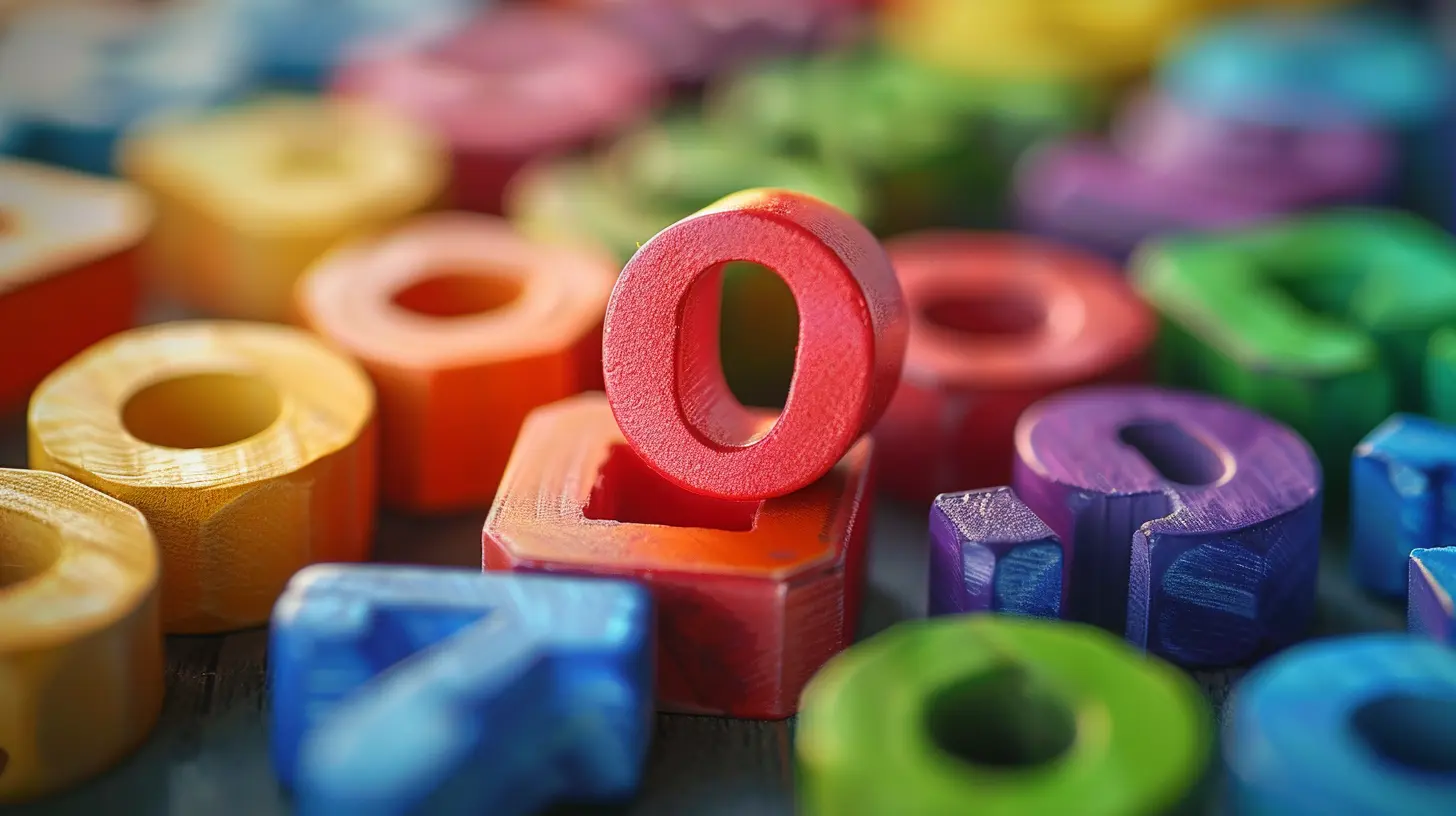The Importance of Early Math Skills for Future Success
12 June 2025
Have you ever watched a toddler stack blocks into a towering castle or count their toy cars before bedtime? It may seem like simple play, but beneath those innocent giggles lies the foundation of something incredibly profound—early math skills.
Let’s take a deep dive into why those early years of math exposure matter so much. Why does counting to ten, recognizing shapes, or understanding how much “more” or “less” means set our little ones up for future greatness?
A Gentle Start: When Math Meets Babble
Math doesn't wait for the classroom. It sneaks in quietly, almost like a lullaby. Think about it: babies notice patterns in music, rhythms in lullabies, and even sequences in daily routines. That’s math in its softest form.By the time a child hits preschool, they're already absorbing the language of numbers, sizes, and patterns. And guess what? Research backs this up. Kids who show strong math skills in early childhood tend to do better not only in later math coursework but in reading too. Surprising, huh?
So what's going on here? Why is early math such a big deal?
More Than Numbers: What Early Math Really Teaches
Math in early childhood is so much more than just numbers. It's about:- Patterns – Recognizing what comes next.
- Counting and Cardinality – Knowing numbers and what they represent.
- Measurement – Understanding big and small, long and short.
- Spatial Relationships – Figuring out how things fit together or relate in space.
- Logic and Problem-Solving – Thinking ahead, making decisions, and testing ideas.
These don’t just shape the future mathematician; they mold the future thinker, planner, and doer. It’s like giving them a toolbox packed with mental gadgets they’ll use for the rest of their lives.
It’s Not Just Math—It’s Brain Wiring in Action
Let’s paint a picture. Imagine a child learning to sort buttons by color and size. They’re not just preparing to ace algebra years down the line—they’re organizing thoughts, managing information, and developing memory muscles.Early math builds executive function skills, like:
- Working memory (keeping multiple ideas in mind)
- Focus and attention
- Flexibility in thinking
These are the cognitive heavyweights behind every subject, not just math. That’s why early exposure to math isn’t just preparation—it’s transformation.
The Domino Effect: From Preschool to Prosperity
Now let’s fast-forward. Kids with strong early math skills show higher academic achievement later on. We're talking better grades, higher test scores, and even college readiness.But it goes even deeper. Studies have shown that early math success correlates with:
- Higher graduation rates
- Better career opportunities
- Increased earning potential
Why? Because math teaches resilience and logic. It nurtures curiosity. It encourages a mindset that says: “I don’t know this... yet.” And that "yet" is the magic that keeps the wheels of success turning.
Math and Confidence: Building a Strong Self-Image
You’ve probably heard someone say, “I’m just not a math person.” That phrase? It starts in childhood.But give a child early wins in math, and confidence blooms. They start to believe they can figure things out, solve problems, and take on challenges. That’s not just good for math—it’s good for life.
Let’s face it: confidence is a superpower. And early math is one way to hand that cape to every child.
Daily Life = A Math Playground
You don’t need to be a teacher (or own a chalkboard) to teach early math. Life hands us opportunities every day. Here are a few simple ways to sneak math into your child’s world:- Cooking Together: Measuring cups, counting ingredients, and dividing portions—it’s all math.
- Grocery Shopping: Ask questions like “Which bag is heavier?” or “How many apples do we need?”
- Playtime: Building blocks, puzzles, board games—they all involve math concepts like spatial awareness and reasoning.
- Story Time: Read books that involve counting or problem-solving.
Every moment is a math moment, if you look through the right lens.
Tech and Tools: A Digital Boost (But Keep It Balanced)
Let’s be real—kids today are digital natives. Apps and games can help, but they should build on real-world experiences, not replace them. A child pressing numbers on a screen isn’t the same as counting actual buttons or laying out blocks.Interactive learning works best when it’s paired with hands-on play and real human interaction. So sure, break out the math apps—but also roll up your sleeves and dive into some real-life math fun together.
The Parent Power: Your Role is Huge
Here’s the heart of it—parents and caregivers are the MVPs in early math learning.You don’t need a degree in education to raise a math whiz. In fact, you’re already doing it when you:
- Encourage curiosity
- Ask “how” and “why” questions
- Let kids solve problems their own way
- Celebrate effort over perfection
Your attitude about math matters too. If you show excitement and interest, your child will follow your lead. And if you’re nervous about math? That’s okay! Let your child see you learning and growing too. That’s a powerful lesson in itself.
Teachers: The Architects of Future Thinkers
Of course, teachers also play a critical part in this journey. In classrooms full of exploration and discovery, math becomes a joy rather than a job.Great early childhood educators:
- Create math-rich environments
- Use playful teaching methods
- Differentiate to meet each learner’s level
- Foster a love for patterns, puzzles, and problem-solving
When teachers treat math like a language rather than a subject, they give kids the fluency to speak it confidently.
Closing the Gap: Equity in Early Math
Here’s the tough but important truth: not all children have the same access to high-quality early math experiences.Socio-economic factors, access to preschool, and even cultural perceptions about math affect how—and whether—these essential skills are developed early on.
That’s why pushing for equity in early education matters. Every child deserves a strong start. Every child should enter kindergarten already feeling like a mathematician in the making.
Your Action Plan: Planting the Seed Today
Ready to support early math in your home or classroom? Here are a few quick takeaways:- Make math playful, not stressful.
- Encourage open-ended exploration.
- Use everyday activities to spark math talk.
- Celebrate mistakes as learning opportunities.
- Cultivate a growth mindset around math.
Remember, early math isn’t about memorizing digits—it’s about building relationships with the world. When kids start to see math not as a mystery but as a map, they feel empowered.
Math is everywhere. It’s in the beat of a song, the curve of a road, the rhythm of a story, the steps of a dance. And when children learn to see it—to feel it in their bones—they begin to see possibilities, not problems.
Final Thought: A World Built on Numbers
Here’s something poetic to leave you with.When we teach children to count, we don’t just give them numbers—we give them stories to tell, problems to conquer, and dreams to chase. We’re shaping architects of bridges, composers of symphonies, coders of software, healers of bodies, and explorers of stars.
Early math is not a test—it's an invitation. An opening note to a lifelong symphony of thinking, wondering, and discovering.
So let’s start early. Let’s start warmly. And let’s never stop counting on our kids—and teaching them how to count on themselves.
all images in this post were generated using AI tools
Category:
Child DevelopmentAuthor:

Olivia Lewis
Discussion
rate this article
3 comments
Josie McEachern
Early math skills lay the foundation for critical thinking and problem-solving in future success.
June 20, 2025 at 4:31 AM

Olivia Lewis
Thank you for highlighting this crucial point! Early math skills indeed form the bedrock for critical thinking and problem-solving abilities essential for long-term success.
Max Mullen
Early math skills lay the foundation for lifelong learning and success. Truly vital!
June 15, 2025 at 12:00 PM

Olivia Lewis
Thank you for your comment! I completely agree—strong early math skills are essential for long-term academic and professional success.
Iliana McCord
Early math skills pave the way for limitless futures!
June 14, 2025 at 4:23 AM

Olivia Lewis
Absolutely! Early math skills are foundational for critical thinking and problem-solving, setting the stage for future opportunities.



